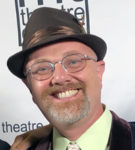
SAN DIEGO — In the midst of the Black Lives Matter demonstrations against systemic racism and police brutality, San Diego Repertory Theatre decided to ask itself a hard question. How can we do better? Theatre folk are generally progressive, but we all have cultural blind spots. And there’s always room for improvement.
Moderated by Ahmed Dent, we heard from a panel of prominent African-American theatre voices in our community:
- Delicia Turner-Sonnenberg, the founder and former Artistic Director of Moxie Theatre
- Antonio “TJ” Johnson, an actor and teaching artist
- Michael Taylor, who sits on the Board of the Old Globe and hosts the podcast, Theatre Corner.
- Yolanda Franklin of Common Ground Theatre Company
- Jacole Kitchen, Casting Director for the La Jolla Playhouse
- Dajahn Blevins, a behavior modifcation specialist who utilizes the arts to reach at-risk youth with San Diego Urban Warriors Inc.
Dent started by asking about the particular challenges that have bothered them.
TJ: The thing that needs to change is how we’re perceived in this business. … We’re locked into a perception of who we are and what we can do.
TJ recounted an audition where the director was surprised that he had once played Clarence Darrow. He explained that he was an actor, not a “black-tor.” They all laughed when TJ said that every “black show” draws so many of the same actors that auditions start to feel like a family reunion.
And there’s a perception that the Black community will only buy tickets for Black shows. So theatres will buy ads in Voice & Viewpoint for an August Wilson play, but not Shakespeare. Yolanda Franklin would like to see greater support and mentorship for smaller companies like her own.
There is a lack of representation at the top levels. Theatres can apply for grants that showcase diversity, but those diverse voices may be absent in the planning stages. Michael Taylor is one of only two Black persons on the Old Globe’s board of fifty. And Jacole Kitchen is often the only dark-skinned person in the office. Delicia Turner-Sonnenberg doesn’t let them close the door. If she’s not invited to the conference room, she’ll find a way to “crash the party.”
Blazing his own trail, Dajahn Blevins never wanted to be part of “White Theatre.” When he was a boy, his grandfather warned him not to think that White folks applauding his talents meant that they accepted him as a person. Ahmed Dent chimed in with a pithy quote by Emma Hallberg. “They want our rhythms but not our blues.”
Always assertive and forthright, Delicia Turner-Sonnenberg encouraged everyone to claim their personal power. “Stop apologizing that your experiences are different. … It doesn’t make us less, it makes us different. … Value the different.”
I’m glad to have been privy to this “uncomfortable conversation.” There were moments when I wanted to argue, but sometimes it’s better for me to contribute only my ears. Jews are well-represented at every level of the arts, from the board to the ushers. And the fact that I’m writing this article for a Jewish publication says something about our community and the arts. But just as Rabbi Abraham Joshua Heschel marched with Dr. Martin Luther King Jr., we in the theatre community can add a few more chairs to the table, contributing our ears to a wider, less comfortable but more inclusive conversation.
*
Eric George Tauber is a freelance writer who specializes in coverage of the arts. He may be contacted via eric.tauber@sdjewishworld.com